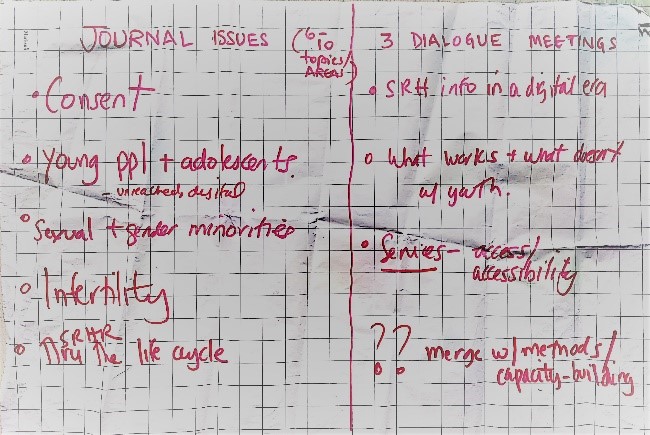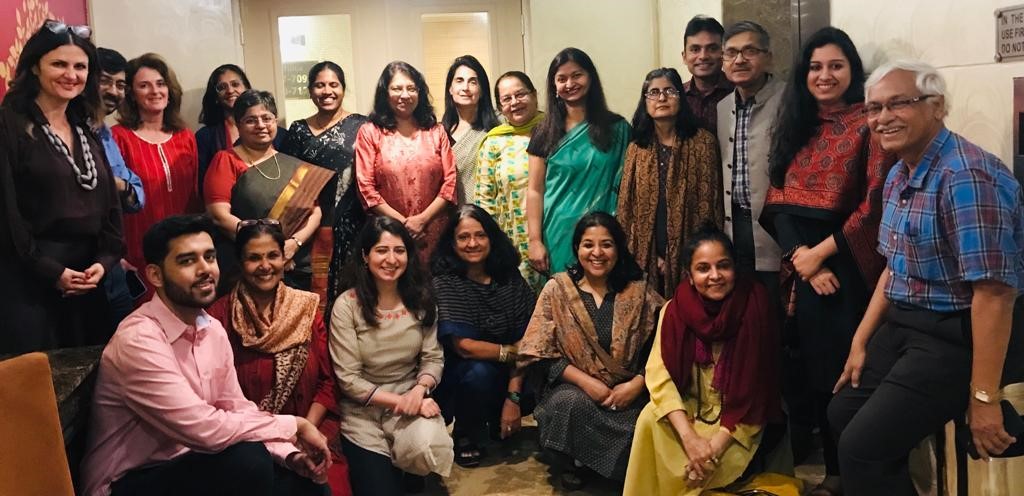Written by Shreshtha Das, Consultant for SRHM
Sexual and Reproductive Health Matters (SRHM, formerly Reproductive Health Matters) has long been considered as a truly global open access peer-reviewed Journal. It has, however, always been much more than a journal. A broader commitment has been manifested in the translation of selected papers into seven language editions other than English. By building capacity and partnering with local organisations, SRHM is ensuring that the next generation of researchers, policy makers, service providers and advocates from the Global South are well equipped to address SRHR issues locally and globally.
In 2018, SRHM launched a new strategy that includes re-orienting the language editions towards a stronger regional organisational presence as a journal, but also as a knowledge hub for dialogue and action on SRHR, with the aim of creating regional, national and community ownership in knowledge creation. With the support of Gates Foundation India, SRHM has launched its first regional initiative in South Asia, and hosted a Strategy Meeting on 5-6 March, 2020 in New Delhi, India. The strategy meeting brought together SRHR organisations, practitioners, researchers, academics and advocates, government champions, youth leaders and other key stakeholders who are committed to progressive social and political changes on SRHR issues, especially from India and some prominent experts from Bangladesh. Further dialogues to take the freshly developed regional strategy forward are planned to be held in Sri Lanka, Nepal and Pakistan.
Over the past 27 years, SRHM has already published over 150 articles from the South Asia region, covering a range of issues such as maternal health, abortion, SRHR of adolescents, health systems, policy and access, family planning and contraception, among others. However, through this initiative, SRHM aims to dive deeper into the regional context and address priority areas of concern from a rights- and evidence-based perspective. The strategy meeting provided a crucial space for key stakeholders in the region to discuss and debate critical questions around what constitutes rights- and evidence-based knowledge on SRHR from a regional perspective; what forms capacity building should take; and what are emerging and priority issues around SRHR in the region.
Rights-based and evidence-based knowledge creation
As one of the priority area of inquiry that needs greater investigation at the global and regional level, the sessions unpacked the question of what constitutes “rights” and “evidence”, how to embed a rights-based approach in knowledge creation methodologies and how research and knowledge can be used for advancing policy and programme development and advocacy.
Given that SRHM plays a crucial role in bringing alternative source of knowledge to the SRHR discourse, the group considered the importance of acknowledging various rights-based methodologies for evidence and knowledge creation, including qualitative, quantitative and mixed methods, legal and policy research and analysis within a multi-disciplinary scope of interest.
Recognising the space that SRHM provides for legitimising and giving credibility to local knowledges held by community groups, the meeting stressed the need to promote and further adopt methodologies of knowledge creation that foreground community voices, whether those communities may be rural women, sex workers, transgender people, women living with disabilities and so forth. We need, therefore, to push the boundaries of what constitutes “knowledge” and “evidence”, to ensure that the meaningful participation of the community as equals is ensured at every stage, including both the right to be meaningfully involved in the knowledge creation process as well as the right to use the knowledge product generated.
There was consensus among the group on the importance of defining research questions, and whether and how they include rights considerations, such as consent, choice, decision making capacity, accountability, equity, access and quality. The participants stressed the need for research questions to be expansive enough to address discrimination and stigma in service delivery and take into account the social determinants of health. The discussions also unpacked critical questions around ethical considerations that guide the researcher, highlighting that any research and accompanying process should be driven by the best interest of affected populations.
Thus the discussions pointed to some key considerations that could guide SRHM and its partners as they move towards further developing and influencing knowledge creation in the region in general, and in the space of the SRHM Journal in particular.
Capacity building and mentoring
The second critical point of discussion centred around capacity building for undertaking rights- and evidence-based research and publishing in peer-reviewed scientific spaces. As is common to SRHM’s process, a significant accompaniment to the regional journal issue would be a capacity building and mentoring component. While mentoring has always been an integral part of the development of journal articles, fostered through the editorial process, the capacity building initiative envisaged as a part of this process seeks deeper, more sustained and longer term engagement that is rooted in regional expertise, engagement and collaboration.
As decided at the meeting, a key component of the regional initiative which is centred around the South Asia Regional Edition of the SRHM Journal, will be capacity building in the form of a mentoring programme that is regionally developed, owned and administered. Part of this programme would be the announcement of fellowships and identification of mentors, who would work together throughout a guided 20 months-long mentoring programme. The mentoring process will involve a range of activities, from methodology workshops, to webinars, one-to-one meetings with mentors, analysis and writing workshops.
Through the meeting it emerged that the fellowship and mentoring process should necessarily be inclusive for a wide range of stakeholders, from academics, researchers and activists to community groups themselves. In reaching out to this wide cohort, SRHM will aim to provide a space to both young and experienced researchers who would like to have more in-depth knowledge in rights-based methodology. By this means, the process of knowledge creation can be truly decentralised and democratic and challenge the assumptions of power hierarchies of knowledge between researchers and community groups. The participants offered many solutions for how this diverse group could be accounted for in designing the fellowship workshops.
Most importantly, the process of fellowship and mentoring would be a collaboration between mentors and fellows, to ensure the furthering of a common good of strengthening and enhancing a community of global and regional thinkers promoting rights-based and evidence-based knowledge on SRHR.
Thematic scope of the SRHM South Asia Regional Journal Issue
The meeting also threw light on emerging and priority issues as well as gaps pertaining to SRHR discourse in the region. An analysis conducted by SRHM of the journal articles published from the South Asia region revealed that most research publications over the past 27 years, since the inception of the Journal, have focused on abortion (21%), health systems, policy and access (16%) ,maternal health (15%), family planning and contraception (8%) and adolescents and young people (8%). There has been engagement on issues related to human rights (5%), HIV/AIDS (5%), sexuality and sexual rights (5%), and sexual violence (5%), but more limited coverage of sexual health education (2%), sex work (2%) infertility (1%), menstrual hygiene (1%), refugee and migration issues (1%) and reproductive cancers (1%) and not much around intersection areas of concerns such as ageing.
Based on trends revealed by SRHM’s study and the assessment of the stakeholders present at the meeting, gaps were identified to determine which areas of knowledge creation needed emphasis and a list of priority issues was developed. These included areas such as the SRHR of adolescents; SRHR of LGBTI populations; the impact of socio-political and economic development on SRHR; the impact of marginalisation and discrimination; investigating the SRHR relevance of power and hierarchy; consent, agency and choice; examining opportunities and challenges around technology and SRHR; and over-medicalisation and self-initiated interventions.
It was decided that the call for papers for the Regional Journal Issue will have a more general SRHR focus, while calling attention to the importance of the above-mentioned areas of concerns.
 |
 |
Way forward
The strategy meeting and the setting up of the South Asia regional hub mark the beginning of an exciting journey for SRHM, allowing it to build on existing partnerships, networks and collaborations to advance a rights-based agenda for knowledge creation on SRHR in the region and with global relevance. Over the coming months, watch the SRHM space for the calls for submissions, mentorships and fellowships from the South Asia region. SRHM will also be kick-starting the rights-based methodology knowledge creation initiative, starting in the coming months with webinars and thematic dialogue meetings focussing on the South Asia region, but with global collaborations and relevance.
Beyond the regional issue and the upcoming fellowships, the SRHR community can also look forward to the addition of new tools and webinars on conducting rights-based capacity building that will emerge from the process, and feed into a repository of analytical tools and approaches in capacity building on SRHR.
In turn, SRHM looks forward to the continued engagement and support from the SRHM community as we and our partners in South Asia embark on this new initiative, based on collaborations, exchanges and inclusive, intersectional processes in regional spaces.
For further information please contact [email protected] or visit our website at SRHM.org.

